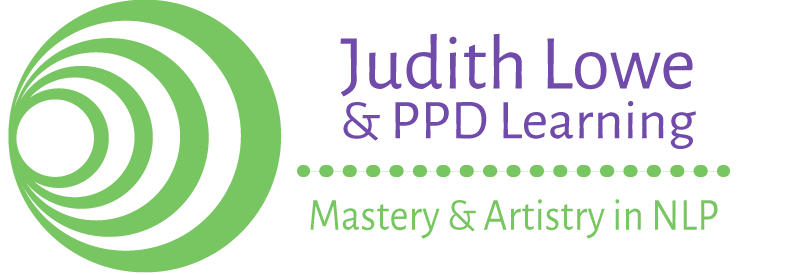Judith Lowe & PPD Learning Blog
Leadership, resilience and kindness in troubled times.
How skillful, systemic NLP tools and approaches can help us.
Like many people in the UK I’m still in shock and disbelief at the results of our referendum, the collapse of our economy and political system, and the rise of racism and hate crimes on our streets.
PPD Learning has always been an international training company with many students, clients, friends and colleagues from all over the world and especially in Europe. We value diversity and community. Our vision and mission relate to social change, peace and justice in the world.
Read Rapport magazines article on Judith Lowe and PPD Learning's new book: 'The NLP Practice Group Book'
An interview with Dido Fisher NLP Trainer and Horse Whisperer about our upcoming NLP in Practice workshop. Suitable for all levels of NLP: Practitioners, Master Practitioners, Trainers and Coaches.
In NLP we say ‘You cannot not communicate.’ – which comes originally from the philosophical and experimental research by Bateson, Watzlawick, Jackson, Beavin Bavelas et al, as they attempted to describe the indescribable – the interactional patterns, pathologies and paradoxes and what they called the ‘pragmatics’ of human communication.
The foundation of NLP in practice is surely a fundamental emotional intelligence.
This tends to be coded at its simplest, in basic NLP terms, as rapport, calibration and state.
However, sometimes this seems to denote only a purely technical and instrumental procedure prior to committing NLP on someone!
Part 1. “Making a fool of myself”
Reframing and The Inner Game of Performance
Though at first, this advice may not seem specially super helpful, I think it’s only fair to point out that, depending on what you mean by “making” and “fool” , it happens. We can sometimes actually get it wrong, we can…
Film blog from Judith Lowe's garden, giving you an update on what's happening at PPD Learning, and also some reminders for practicing your NLP.
Truly, incredibly, thanks to the UKweather, I spent the weekend reading Moneyball by Michael Lewis.
Incredibly, because what I know, understand and care about baseball is zero. Even saying that doesn’t quite convey the deep chasms of my ignorance and lack of concern, like, as the young folks say….whatever.
According to Gary Trudeau (Doonsbury), “You win by not getting out.” Hmmm.
Especially if you don’t want to be a trainer or therapist? Do we, as a field, have any plans for this?
Maybe you’ve done your training, you’re still excited about learning NLP, but somehow never get round to really challenging yourself to take your learning to the next level?
Or you’ve done a couple of the shorter courses and you believe, and in some cases have been told, that you are pretty much ready to call yourself an expert? (yikes!)
Maybe you just don’t know there’s anywhere else to go?
In our new ‘post-truth’ world being heralded in triumphantly by Mitt Romney, the unloved and unloveable Republican candidate in the U.S Election, I have been practising my new spiritual discipline of staying calm and centred while egregious lies rain from the heavens.
Mitt’s campaign is so full of outright sh*te I can barely believe my eyes ands ears.
Well, how wonderful was that?!
Of course the map ain’t the territory and every version of the past, present and future is just a story and always a biased and distorted one too. Maybe even more so when it’s our national myth and we’re going through such a huge sea change?
Lots left out, much bad not said… but hey, the isle was certainly full of noises.
’m somewhat wearily engaging in the current Richard Wiseman NLP Eye Cues research debate.
Ridiculous really, as his position that he has ‘debunked’ a major claim of NLP is based on zero reality. In fact his research on lying is, somewhat ironically , itself based on a lie!













Interview with our guest artist Nina Runa Essendrop a Danish LARP designer and performance artist who has spent the majority of her life exploring the world through live-action role play. Her LARPs focus on investigating the basic sensory experiences and human emotions that are so common in our everyday lives, yet are so often pushed aside in favor of more rational ideas and actions. Favoring abstract soundscapes over words or dialogue, she encourages her performers and audiences to experience both the joys and sorrows of living through play as a way of preparing for real life outside the theater.